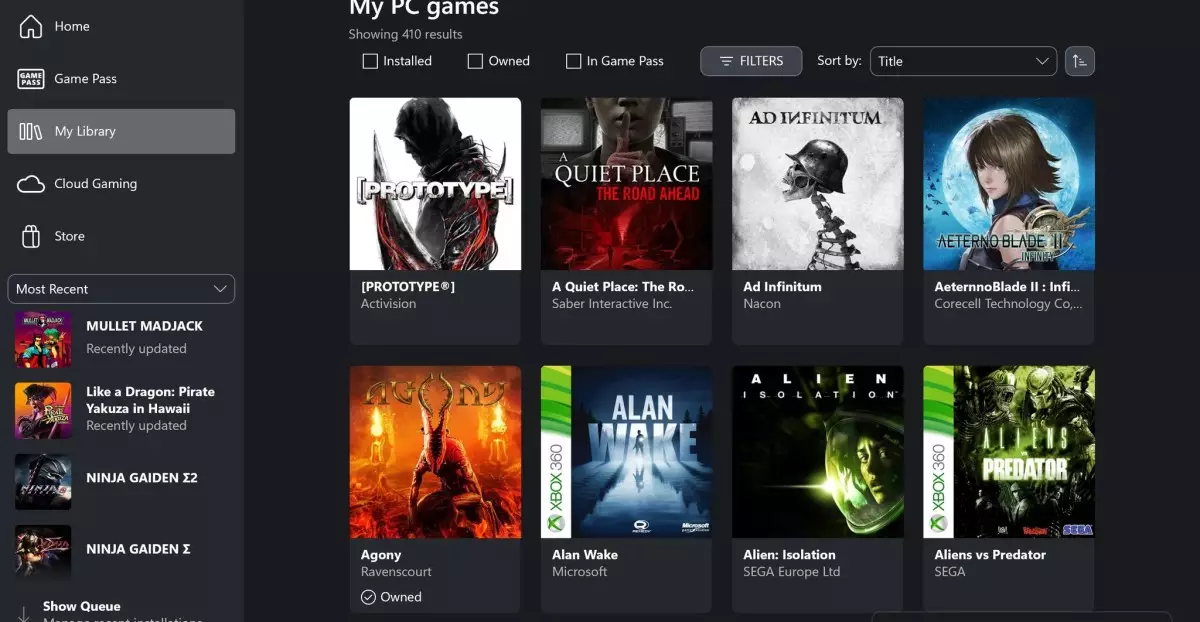In recent weeks, a noteworthy shift has emerged from the Microsoft landscape, particularly in the realm of gaming. The company’s ambitious plan to unify its Xbox and Windows platforms is not just a speculative venture; it is rapidly gaining palpable traction. The Xbox app on Windows recently showcased an intriguing feature: the display of Xbox console games within its library. This development signals a shift in strategy that hints at something far more profound than mere cosmetic adjustments.
Tom Warren, a seasoned journalist and senior editor in technology reporting, has illuminated the implications of this move. The registration of Xbox 360 titles, like the original *Alan Wake*, in the library—even if not directly installable—points towards a broader initiative aimed at consolidating gaming experiences across systems. This can’t merely be dismissed as a software glitch. Instead, it is likely indicative of Microsoft’s intent to create a comprehensive gaming ecosystem that caters to both PC and Xbox users alike.
Envisioning a Unified Gaming Library
The larger picture becomes clearer when we consider Microsoft’s goals for integrating Xbox and Windows platforms. This initiative, dubbed Project Kennan, is not merely about creating an app that shows off games but is intertwined with the development of handheld devices that harness the capabilities of both ecosystems. By fostering a universal library, Microsoft envisions a future where games are not differentiated by their platform but can be seamlessly accessed based on user preference.
The significance of this endeavor cannot be understated. In a gaming world where services like Steam and Epic Games have firmly established their dominance, Microsoft’s objective is to reorient the gaming experience so that it becomes centralized within the Xbox app. The expectation that titles from competitors such as Steam and the Epic Games Store will also be visible indicates a brave strategy that might encourage greater user engagement with the Microsoft platform.
The Evolution of Branding and User Experience
With the recent rebranding of the Xbox PC app—now simply referred to as “Xbox PC”—Microsoft is deliberately positioning itself to invigorate its gaming brand. This move has already been evidenced in various promotional materials surrounding upcoming releases. By clearly establishing this branding, Microsoft is not only promoting its games but is also relaying the distinct vision of a cohesive gaming community.
Moreover, this rebranding coincides with the push to improve user experience through better navigation and accessibility. Gone are the days of convoluted interfaces that separate console and PC gamers; Microsoft is championing a more interconnected gaming culture where gamers, regardless of the device in hand, can easily track and manage their gaming library.
Facing the Challenge of Cloud Gaming
However, while these developments showcase great promise, Microsoft still faces challenges, particularly concerning the compatibility of Xbox console games on PC. The ongoing evolution of cloud infrastructure raises vital questions: Will these games be merely visible, or will players actually be able to engage with them on their PCs? The impending response to this query is crucial, especially given the rising popularity of SteamOS and its adoption in handheld gaming devices from various manufacturers.
To fully realize the ambition of playing legacy Xbox titles on PC, Microsoft will need either a significant breakthrough in emulation technology or a robust cloud gaming solution that can bridge performance gaps. Such advancements could represent a watershed moment for both Xbox and PC gamers—one that positions Microsoft as a pioneer in the gaming field.
Anticipating Future Developments
Looking ahead, the strategic changes underway within Microsoft indicate an invigorating future for the gaming landscape. With the convergence of Xbox and Windows, gamers can anticipate a more unified experience that promises flexibility, accessibility, and perhaps a renewed sense of community. The continued evolution of the Xbox app, coupled with innovations in handheld gaming, sets the stage for an exhilarating chapter in gaming history.
As Microsoft pushes the boundaries of integration and innovation, the question remains: will they be able to truly redefine what it means to be a gamer in an era increasingly defined by multifaceted gaming experiences? One thing is for certain; the attention of the gaming world is firmly fixed on Microsoft as they endeavor to unlock a future where all gamers may find common ground.

